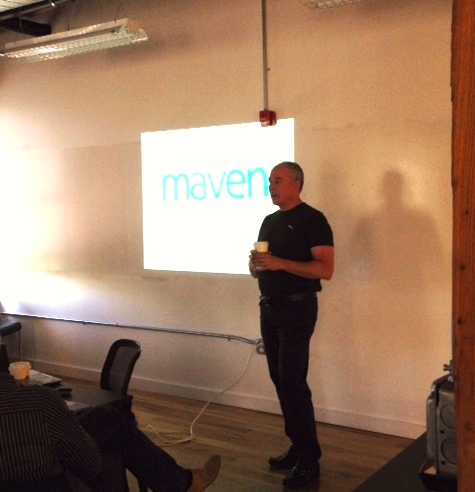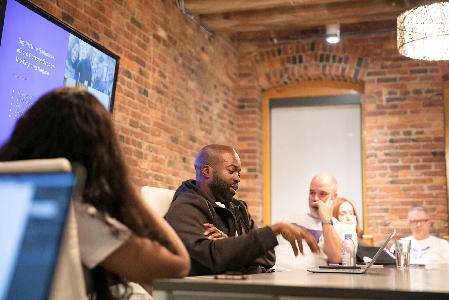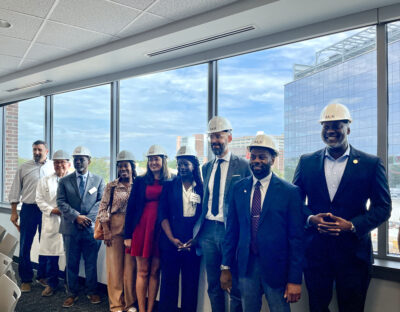Sitting comfortably in the sleek but cozy common space in Baltimore’s Emerging Technology Centers-Haven Campus, Tony D’Agostino clearly enjoys discussing the ills and opportunities within the American healthcare system.
With an almost professorial manner, D’Agostino, 55, aims to cut to the heart of the debate about efforts to bend the health cost-curve, improve outcomes and reduce costs for individuals and families.
“They say as much as one-third of the $3 trillion spent on healthcare in this country could be unnecessary spending,” says D’Agostino. “It’s a crazy number.”
And it’s this problem that spurred D’Agostino to launch his startup, Maven Medical, in December 2013.
Comprised of eight full-time employees housed at the ETC-Haven office, Maven is a venture-backed startup with investments from Bloomberg Beta (lead investor), MkII Ventures, and TEDCO’s Technology Commercialization Fund. Additional funding has come from Maven’s co-founders and friends.
D’Agostino points to his company’s tagline to describe its solution to the problem at hand: improving healthcare economics and outcomes one better-informed doctor at a time.
###
Maven’s product is an enterprise SaaS tool, hosted by Google’s HIPAA-compliant cloud platform, and which integrates with any of the Electronic Health Records (EHR) vendors, including Cerner, Epic, GE and McKesson.
With Maven’s technology integrated into these platforms, doctors can know the relative costs of tests and lab orders for patients at the point of care — and not months or longer down the line. By adding this transparency into the myriad costs of diagnosing and providing medical care, D’Agostino says, doctors can begin to make better clinical decisions while reducing unnecessary medical actions that, cumulatively, add significant costs into the overall national healthcare system.
“We’re a clinical decisions support company,” says D’Agostino. “We want to compress the feedback loop so that physicians are getting information closer to the point of care, and in our case, we’re focusing on cost and price transparency as well as evidence-based medicine and getting that information to physicians.”
For one example of how this works, D’Agostino cites the case of a hospital admission for someone who contracts pneumonia.
The most common practice today, according to D’Agostino, is for a doctor to order a chest X-ray, make the proper diagnosis and then order the appropriate treatment. In this process, D’Agostino says, doctors often order second and even third rounds of chest X-rays even while patients are responding positively to treatments. But these follow-on orders, in many cases, may not be necessary or there may be less costly alternative procedures available to physicians. But they have to know more information at that moment in time.
We're not trying to just get doctors to spend less money, just to be cheap and limit care. We're trying to get them to consider what they're spending and to practice evidence-based medicine.
To help doctors make better clinical decisions at the point of care, Maven’s portal brings together into one view basic patient information (such as age, gender, health condition) with related medical transactional data (such as the physician’s orders for labs, drugs and procedures).
Using the Centers for Medicare and Medicaid Services (CMS) average reimbursable rates as a cost baseline, Maven gives doctors price comparisons real-time, enabling them to make more cost-efficient decisions without compromising delivery of care.
D’Agostino also says the portal provides relevant links to a foundation-backed site of industry care guidelines called Choosing Wisely that gives doctors expert counsel on whether certain tests or procedures are necessary in normal cases.
###
D’Agostino says he’s able to bring all the knowledge and experience he’s gained over the course of his career to making Maven succeed. As an undergraduate at the University of Kansas, he earned a degree in atmospheric science, and then went on to complete a master’s of applied physics degree from the Naval Postgraduate School. After a 24-year career in the U.S. Navy, D’Agostino spent the next number of years in equity-trading leadership positions for several major Wall Street firms, including Wachovia and Bank of America.
After deciding he was ready to begin his third career in the world of tech startups, D’Agostino moved to Baltimore and soon came across a peer-reviewed research paper by two Johns Hopkins University physicians, Dr. Dan Brotman and Dr. Lenny Feldman, both of whom now are advisors to Maven.
“The paper found that if physicians are given basic information about what labs cost,” D’Agostino said, “they’ll look at the price of the lab, they’ll consider it and they’ll think, ‘Do I really need to order that lab or can I order an alternative lab?’”
D’Agostino says Maven is still in a very early stage and the company is making in-roads in talking with hospital leadership teams about launching its first live deployment.
“It’s pretty well documented that doctors tend to be the least informed around healthcare economics,” says D’Agostino. “The reason is someone else was always paying. But you know your premiums have gone up, you know your copays have gone up. And patients are now asking the question. So we’re focusing on that cost transparency and best practice transparency for providers.”
Before you go...
Please consider supporting Technical.ly to keep our independent journalism strong. Unlike most business-focused media outlets, we don’t have a paywall. Instead, we count on your personal and organizational support.
3 ways to support our work:- Contribute to the Journalism Fund. Charitable giving ensures our information remains free and accessible for residents to discover workforce programs and entrepreneurship pathways. This includes philanthropic grants and individual tax-deductible donations from readers like you.
- Use our Preferred Partners. Our directory of vetted providers offers high-quality recommendations for services our readers need, and each referral supports our journalism.
- Use our services. If you need entrepreneurs and tech leaders to buy your services, are seeking technologists to hire or want more professionals to know about your ecosystem, Technical.ly has the biggest and most engaged audience in the mid-Atlantic. We help companies tell their stories and answer big questions to meet and serve our community.
Join our growing Slack community
Join 5,000 tech professionals and entrepreneurs in our community Slack today!





